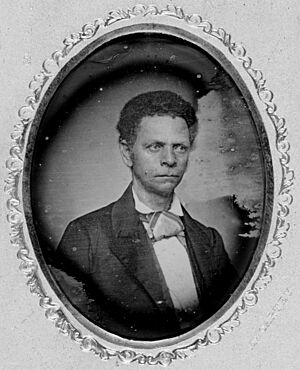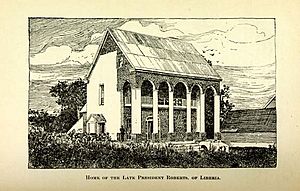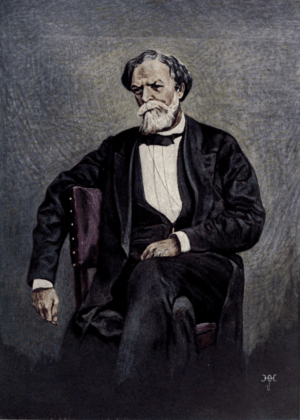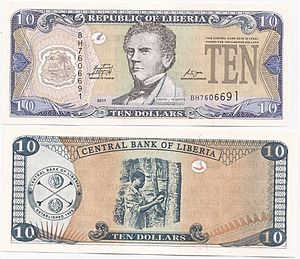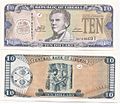Joseph Jenkins Roberts facts for kids
Quick facts for kids
Joseph Jenkins Roberts
|
|
|---|---|
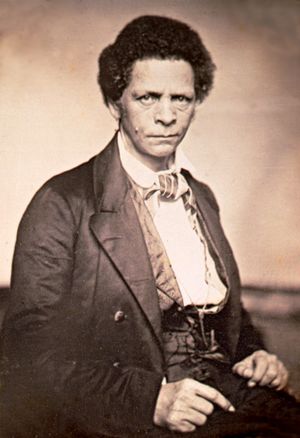 |
|
| 1st and 7th President of Liberia | |
| In office January 3, 1848 – January 7, 1856 |
|
| Vice President | Nathaniel Brander Anthony D. Williams Stephen Allen Benson |
| Preceded by | Position established |
| Succeeded by | Stephen Allen Benson |
| In office January 1, 1872 – January 3, 1876 |
|
| Vice President | Anthony W. Gardiner |
| Preceded by | James Skivring Smith |
| Succeeded by | James Spriggs Payne |
| 2nd Governor of Liberia | |
| In office September 3, 1841 – January 3, 1848 |
|
| Preceded by | Thomas Buchanan |
| Succeeded by | Position abolished |
| Personal details | |
| Born | March 15, 1809 Norfolk, Virginia, United States |
| Died | February 24, 1876 (aged 66) Monrovia, Liberia |
| Resting place | Palm Grove Cemetery Monrovia |
| Political party | Republican Party |
| Spouses |
|
Joseph Jenkins Roberts (March 15, 1809 – February 24, 1876) was an African-American merchant who moved to Liberia in 1829. He later became a very important politician there. He was elected as Liberia's first president (1848–1856) and later its seventh (1872–1876). He was the first person of African descent to lead the country. Before becoming president, he served as governor from 1841 to 1848. Roberts was born free in Norfolk, Virginia. He moved to the West African colony with his family when he was young. In Liberia, he started a trading business and later became involved in politics.
Contents
Early Life and Family
Joseph Jenkins Roberts was born free in Norfolk, Virginia. He was the second oldest of seven children. His mother, Amelia, was a light-skinned woman who had been freed before Joseph was born. She gave most of her children the middle name Jenkins, which might have been their father's last name.
After gaining her freedom, Amelia married James Roberts, a free man of color. James Roberts adopted Amelia's children and raised them as his own. He owned a successful boating business on the James River. Joseph and his siblings were considered to have mostly European ancestry. A historian once noted that Joseph was light-skinned enough to be mistaken for a white man. However, in Virginia, he was seen as a person of color because his mother had African roots.
The family later moved to Petersburg, Virginia. This was an industrial city with many free people of color. As a boy, Joseph worked in his stepfather's business. He helped transport goods on a flatboat from Petersburg to Norfolk. After his stepfather died, Joseph continued to work in the family business. He also became an apprentice in a barber shop. The barber shop owner, William Colson, was a minister and a well-educated Black resident. He let Roberts use his personal library, which helped Joseph get much of his early education.
Marriage and Moving to Liberia
In 1828, Roberts married Sarah, who was 18 years old. They had a baby. In 1829, they all moved to the new colony of Liberia. This move was supported by the American Colonization Society. Sadly, both Sarah and their child died within their first year in the colony. Many early settlers faced high death rates due to diseases in the new colony.
Some time after his wife's death, Roberts married again. He married Jane Rose Waring in 1836 in Monrovia, Liberia. Jane was the daughter of other Virginians who had also moved to the colony.
Starting a New Life in Liberia
Roberts learned about the American Colonization Society's efforts to create the colony of Liberia. He decided to join a group of Virginians moving to Monrovia, the capital of the new colony. Even though Roberts was educated and a successful merchant, he chose to leave Virginia. This was because there were many restrictions on free people of color in Virginia.
The Roberts family was very religious. They felt it was their duty to share their faith with the local people of Africa. On February 9, 1829, they sailed to Africa on a ship called the Harriet. Joseph's mother and five of his siblings were also on board. Another passenger was James Spriggs Payne, who later became Liberia's fourth president.
Before leaving for Liberia, Roberts started a business with his friend William Nelson Colson. Their company, Roberts, Colson, & Company, continued to grow even after Roberts moved. They exported products like palm oil, camwood, and ivory to the United States. They also sold American goods at a store in Monrovia. Roberts traveled to the United States several times for the business. In 1835, Colson also moved to Liberia but died soon after. The Roberts family became very successful traders.
Joseph's brother, John Wright Roberts, became a minister in the Liberian Methodist Church. He later became a bishop. Their youngest brother, Henry Roberts, studied medicine in Massachusetts. Joseph was successful enough to pay for Henry's education. Henry returned to Liberia to work as a doctor.
In 1833, Joseph Roberts became the High Sheriff of the colony. One of his jobs was to organize groups to collect taxes from the local people. He also helped stop raids against the colonial areas. In 1839, the American Colonization Society made Roberts the vice governor. Two years later, after the governor died, Roberts became the first African-American governor of Liberia.
In 1846, Roberts asked the legislature to declare Liberia independent. He also wanted to keep working with the American Colonization Society. The people voted for independence. On July 26, 1847, eleven delegates declared Liberia an independent nation. Roberts won the first presidential election on October 5, 1847. He officially became president on January 3, 1848, with Nathaniel Brander as his vice president.
First Presidency (1848–1856)
Roberts was re-elected three times. He served a total of eight years as president. He lost the election in 1855 to his Vice President, Stephen Allen Benson.
It was challenging to build a new country with only about 3,000 settlers. Some local groups living along the coast became Christians and learned English. However, most of the native Africans kept their traditional religions and languages. They also continued to be involved in the Atlantic slave trade with European traders. The slave trade was illegal but still happened in some Liberian ports. The British and U.S. Navies eventually helped stop it in the 1850s.
Building Foreign Relations
During his first year as president, Roberts worked to get Liberia recognized by other countries. The United States did not recognize Liberia at first, mainly because southern politicians opposed it. In 1848, Roberts traveled to Europe. He met Queen Victoria and other leaders. The United Kingdom was the first country to recognize Liberia as independent. France followed in 1848 or 1852. By 1849, several German cities, Portugal, Brazil, Sardinia, and Austria also recognized Liberia. Other countries like Norway, Sweden, Haiti, and Denmark recognized Liberia later.
The United States did not recognize Liberia until February 5, 1862. This happened during the presidency of Abraham Lincoln. Some believed the U.S. government was concerned about the social status of Black diplomats in Washington, D.C. Soon after Liberia's independence was recognized, slavery was abolished in Washington, D.C.
Working with Local Groups
In 1854, the Republic of Maryland, a colony next to Liberia, declared its independence. However, it did not join Liberia right away. It controlled land along the coast. In 1856, Maryland asked Liberia for military help in a war against the Grebo and Kru peoples. These groups were fighting against Maryland's efforts to control their trade. Roberts helped the Maryland colony. The combined forces of the two African-American colonies won the war. In 1857, the year after Roberts left office, the Republic of Maryland joined Liberia. It became Maryland County.
During his presidency, Roberts expanded Liberia's borders along the coast. He also tried to help the local people around Monrovia adopt Americo-Liberian culture. This was mainly done through education and religious conversion.
Economy and Nation Building
The settlers built schools and Liberia College, which later became the University of Liberia. In these early years, farming, shipbuilding, and trade grew.
Roberts' Leadership Skills
Roberts was known as a very skilled leader and diplomat. His leadership was key to Liberia gaining its independence and becoming a sovereign nation. Later in his career, his diplomatic skills helped him work well with local groups. He also navigated the complex world of international law and relations effectively.
Between Presidencies
After his first presidency, Roberts served for fifteen years as a major general in the Liberian Army. He also worked as a diplomatic representative for Liberia in France and Great Britain. In 1862, he helped start Liberia College in Monrovia. He was its first president until 1876. Roberts often traveled to the United States to raise money for the college. He also taught law and international relations at the college until he died.
Second Presidency (1872–1876)
In 1871, President Edward James Roye was removed from office. This happened because he was thought to be planning to cancel upcoming elections. Roberts, a leader of the Republican Party, won the next election. He returned to office in 1872. He served two terms until 1876. From 1875 until early 1876, Roberts was sick. Vice President Anthony W. Gardiner served as acting president during this time.
In the 1860s and 1870s, Liberia faced growing economic problems. Monrovia's control over the coastal local populations weakened, leading to several conflicts. Conditions got worse after Roberts' second presidency. The cost of goods Liberia imported was much higher than the money earned from exports like coffee, rice, palm oil, and timber.
Legacy and Remembrance
Roberts died on February 24, 1876, less than two months after his last term as president ended. He was buried in Palm Grove Cemetery in Monrovia. In his will, he left $10,000 and his property to Liberia's education system.
Today, Liberia's main airport, Roberts International Airport, is named after him. The town of Robertsport and Roberts Street in Monrovia also bear his name. His face is shown on the Liberian ten dollar bill, which was introduced in 2000. It was also on the old five dollar bill from 1989 to 1999. His birthday, March 15, is a national holiday in Liberia.
See also
 In Spanish: Joseph Jenkins Roberts para niños
In Spanish: Joseph Jenkins Roberts para niños
Images for kids
 | Sharif Bey |
 | Hale Woodruff |
 | Richmond Barthé |
 | Purvis Young |


